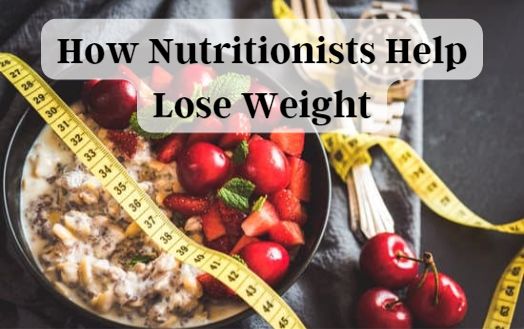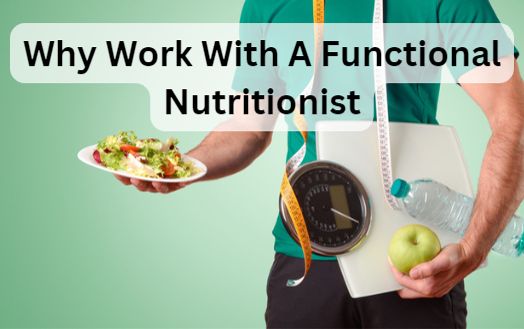Are you looking to get healthier and want professional help? Nutritionists and dietitians are the people who can provide that assistance. But just where do they work? In this article, we’ll explore where do nutritionists and dietitians work so you know exactly who to turn to when trying to lead a healthier life.
Nutritionists only work in hospitals or doctors’ offices. Are they at my gym or health club? Do all supermarkets employ nutritionists? Many of us wonder about our diets, but we don’t know who to ask. Discover how these experts work.
Readers can choose a nutritionist or dietitian based on where they work. Let’s dive deeper into this topic, exploring its nuances, so you can find the right person.
What Is The Difference Between A Nutritionist And A Dietitian
What is the difference between a nutritionist and a dietitian? This is an important question to ask when deciding which professional can best help with your dietary needs. While both professions focus on helping individuals obtain optimal nutritional health, there are some key differences.
Qualifications distinguish nutritionists from dietitians. An accredited practicing dietitian (APD) studied food and nutrition science at a university, while a nutritionist studied at a college or technical school or took an online course. Dietitians work in hospitals, nursing homes, private practice, sports teams, universities, and more. Nutritionists work in fitness or wellness centers.
Know if you’re consulting a dietitian or nutritionist before giving dietary advice. A Dietitians Association of Australia (DAA)-registered dietitian can give government-approved advice. APDs are trained to advise on chronic diseases.
Do your research and make sure the person you consult is accredited by the DAA or another relevant association, such as Sports Dietitians Australia for athletes seeking specialized support, to get good advice. With this knowledge, let’s discuss nutritionist and dietitian education and qualifications.
Education And Qualifications Needed To Become A Nutritionist Or Dietitian
Health-related industries are driving demand for nutritionists and dietitians. Nutritionists and dietitians must know food science, nutrition, and dietetics. Education and qualification requirements vary by country. Australia requires Dietitians Australia-accredited degrees. Bachelor’s degrees in nutrition science or related fields are possible. A Master’s or Doctorate in Human Nutrition can also help you succeed in this field.
Before hiring, most employers require supervised practice hours. These periods teach students how to apply the latest nutrition research to their jobs. Candidates should also attend nutrition conferences and seminars to stay current.
These qualifications ensure that nutritional advisors meet industry standards when helping clients improve their health. Aspiring practitioners should strive for excellence to provide ethical and professional customer service.
Professional Standards For Nutritionists And Dietitians

Dietitians and nutritionists help patients manage medical conditions through diet and lifestyle. Professional standards are necessary for safe practice. Here is a quick overview of the major components:
- Nutrition And Dietetics Education: All practicing nutritionists and dietitians have earned a degree in nutrition or dietetics from an accredited college or university program. This ensures that they possess the knowledge needed to provide accurate advice on dietary needs.
- Professional Licensing/Certification: Most states require nutritionists and dietitians to obtain licensure before providing services as a healthcare professional. The requirements vary depending on location but typically include passing an exam, completing continuing education courses, submitting proof of educational qualifications, etc. Additionally, many voluntary certifications exist which demonstrate competency in certain areas such as sports nutrition, pediatric nutrition, etc.
- Ethical Practice: It is essential for all healthcare providers to act ethically when dealing with patients’ personal information and medical history while also treating everyone equally regardless of their background or beliefs. Ethics codes for both state regulatory boards and national organizations exist to ensure that practitioners adhere to these principles in their day-to-day practice.
These three components of nutritionist and dietitian professional standards help ensure patient safety when providing nutritional advice. These guidelines ensure that qualified practitioners will give fact-based advice. Understanding these standards helps us understand why licensed practitioners are so important—they guarantee quality service and peace of mind that you’re getting the best care.
Where Do Nutritionists And Dietitians Work
After discussing nutritionists and dietitians’ professional standards, let’s discuss their workplaces. Nutritionists can work in many settings. They work for hospitals, private practice clinics, assisted living facilities, and government agencies like public health offices.
Nutritionists specialize in sports nutrition, clinical nutrition, community nutrition, research, and teaching. Dietitians specialize in medical nutrition therapy and topics like renal diets, diabetes management, and eating disorder recovery. Depending on their practice, nutritionists and dietitians need certification.
These practitioners can tailor dietary advice to each patient’s lifestyle and physical abilities. Any practitioner needs this skill to help clients make long-term food management changes. This flexibility makes nutritionists and dietitians useful in many settings, from helping athletes optimize performance with meal plans to engaging elderly clients in fun, healthy eating activities. It’s also why so many employers look for passionate dietitians who want to change lives.
Types Of Settings In Which Nutritionists And Dietitians Work

Dietitians work in hospitals, universities, community health centers, research institutes, and private practices. This is a brief and concise answer to the question, “Where do nutritionists and dietitians work?” Each setting offers unique opportunities to use nutrition expertise to help people. Hospital nutrition therapists assess patients’ nutritional needs and create personalized meal plans. They also help hospital staff feed patients. University nutritionists may teach food science and human nutrition, research diets, or make policy recommendations. Community health centers educate clients about healthy eating and offer counseling for chronic conditions like diabetes. Nutrition experts at research institutes design studies on diets and diseases, while private practitioners advise patients on healthier eating habits to improve their health. Finally, government employees create policies to increase vulnerable populations’ access to nutritious food.
Accredited nutritionists and dietitians must understand how nutrients affect our bodies to create evidence-based solutions for each client, regardless of where they practice. With this knowledge comes great responsibility—from counseling individuals one-on-one to delivering targeted nutrition education programs in communities—making it essential that these professionals use reliable resources when evaluating current trends to give sound advice that benefits everyone. We’ll examine nutritionists and dietitians’ roles in various sectors of society.
Role Of A Nutritionist Or Dietitian In Various Settings
Dietitians and nutritionists contribute to public health, nutrition education, and wellness. Dietitians advise individuals on nutrition, while nutritionists create community programs to promote healthy lifestyles. Research-based recommendations and evidence-informed practices improve everyone’s quality of life.
Nutritionists or dietitians assess patients’ eating habits, create meal plans, recommend dietary supplements, and educate patients about how food affects their health. Nutritionists help develop school lunches and other diet-improvement policies. They may also work with doctors on specialized diets or teach patients how to manage chronic diseases like diabetes through diet.
Private practice nutritionists and dietitians can provide more personalized nutrition advice. These experts customize diet and lifestyle plans based on age, gender, activity level, medical conditions, and more. They empower their clients to make healthier choices for better health.
Working With Clients In Private Practice

Private nutritionists and dietitians work with clients. Individualized meal plans, health education, and needs assessments are possible when we work with people one-on-one. We can also instill lifelong healthy habits.
The client first chooses a dietitian or nutritionist they trust and like. Before hiring, check references, read reviews, and research professionals. After choosing a professional, a client can start researching diets.
Nutritionists and dietitians should spend time getting to know each client to build trust. This relationship will help us understand their goals and give them tailored advice. To get the full picture, we can refer them for bloodwork or food sensitivity tests. With this information, we can determine which nutrients need more attention and recommend foods that may improve their health.
We can advise on physical activity, stress management, and sleep hygiene, all of which contribute to overall wellness, in addition to meal plans. Together with our clients, we can ensure positive results from short-term changes and long-term commitments to healthier living.
Collaborating With Healthcare Professionals In Hospitals, Clinics, Nursing Homes Or Other Institutions
Hospitals, clinics, nursing homes, and other healthcare professionals often work with nutritionists and dietitians. For nutritional and health-related patient care, this is crucial. Based on patients’ medical histories and physical conditions, I recommend meals and snacks, monitor food intake, and track weight and other health indicators.
I also teach staff how nutrition affects various diseases and illnesses to improve patient care. I advise doctors and nurses to follow their special diets. I also advise people with diabetes or heart disease on nutrition.
I encourage staff and patients to eat well in these settings. This includes educating both groups on what foods to eat, cooking demonstrations using nutritious ingredients, creating meal plans for specific health goals, helping people choose healthier options at restaurants and grocery stores, and more. We can provide optimal care for all aspects of health, including nutrition, by working with healthcare providers. This method improves overall health.
Assessing Eating Habits In Educational Institutions Or Corporate Offices

Nutritionists and dietitians assess eating habits in schools and corporations. They create community health and nutrition programs with teachers, administrators, parents, students, and employers. Nutritionists may also assess employee food intake to determine if long-term or night-shift workers need dietary changes. Dietitians can consult with those in need on nutrition and meal planning. This counseling promotes healthy eating throughout the company. These assessments allow nutritionists and dietitians to provide nutritious meals to everyone within their budget. They can improve population health by educating people about diets. They then advise restaurants on menu planning and nutritional standards.
Consulting With Food Service Establishments On Menu Planning And Nutritional Standards
Nutritionists and dietitians consult with restaurants on menu planning and nutritional standards, a growing field. This consultation benefits business owners and customers. Menu designers use nutritionists’ expertise. They can create tasty, dietary-compliant dishes. Dietitians help businesses create nutritionally balanced meals without sacrificing taste or budget by advising on ingredient interactions.
Nutritionists and dietitians can help consumers choose healthier foods by advising food industry professionals on ingredient selection, meal preparation, portion size, nutrient analysis, etc. They can also survey consumers and suggest ways to market healthier products. Thus, these professionals must stay current on food safety and health trends.
Nutritionists and dietitians promote public health through their knowledge of nutrition science and the food industry. These creative professionals can help improve people’s lives by improving access to nutritious foods—something we should all strive for. With this foundation, community organizations can easily create health programs to promote healthy living.
Creating Health Programs For Community Organizations

Dietitians and nutritionists help people achieve their health goals in various settings. They develop nutrition and lifestyle programs for community organizations. Each organization’s needs are tailored to these programs to achieve their goals.
They teach food choices, portion control, and other nutrition topics in lectures, classes, and workshops. Physicians and registered dietitians advice nutritionists and organization members to create action plans. This includes setting achievable goals and offering guidance and support.
Nutritionists can improve public health by advising people on diet. Their knowledge and expertise can change large parts of society for the better. They’re useful for organizations trying to encourage healthier habits. For those interested in this career, becoming an expert witness in nutritional law cases is another exciting option.
Becoming An Expert Witness In Legal Matters Involving Nutritional Issues
After developing community health programs, become a nutritional expert witness. Courts and other professional agencies may request nutritionists and dietitians’ expertise. This could involve testifying about food and nutrition facts, opining on how certain diets might affect a person’s health, or assessing medical conditions’ dietary needs.
To be an expert witness in court, one must have specialized knowledge. This usually requires advanced degrees or certifications, such as board certification from the American Dietetic Association (ADA), and years of patient care experience. One should also know food safety and labeling laws to explain them. Here are some key points to consider when becoming an expert witness:
- Have extensive academic qualifications related to food and nutrition
- Be familiar with relevant laws pertaining to food safety
- Possess several years of clinical practice experience
- Have strong communication skills both verbal and written
Nutritionists and dietitians must stay current on research and legislative changes to succeed as expert witnesses. Writing about nutrition requires detailed analysis and sound scientific reasoning, so good writing skills will help. Writing about nutrition requires detailed analysis and sound scientific reasoning, so good writing skills will help. These factors will help nutrition expert witnesses succeed in legal matters.
Writing Articles Or Books On Nutritional Topics
Dietitians and nutritionists are health professionals. They advise people on diet, exercise, supplements, lifestyle, and other topics. These experts can reach more people by writing nutritional articles or books.
When writing about nutrition, know your audience. Make sure your content is informative and covers their interests. If possible, include personal stories and client case studies. Doing so will add credibility and give readers relatable information they can use.
Finally, read nutrition and dietetics research papers and attend conferences to stay current. This ensures your information is accurate and current. This method will make you a respected expert.
Finding A Qualified Nutritionist Or Dietitian

You may wonder where nutritionists and dietitians work now that you know what they do. Hospitals, health departments, schools, private practices, research institutions, and food companies employ dietitians and nutritionists. Fitness centers and sports teams employ them.
There are many factors to consider when choosing a dietitian or nutritionist. Make sure the person is licensed and certified by their state board of registration and other relevant certifications. When choosing a provider, check previous employers’ references and experience. You should also read online reviews from the dietitian or nutritionist’s former clients. This shows how nutritional counseling helped patients.
Nutritionists and dietitians can research food access programs, develop community education materials on healthy eating, analyze dietary trends in certain populations, and more. These professionals help people live healthier lives by educating them about the importance of nutrition.
Research Opportunities Available To Nutritionists And Dietitians
Dietitians and nutritionists work in many settings. They can conduct research at universities, hospitals, public health authorities, private companies, food industry organizations, nutrition consulting firms, and government agencies. Nursing homes, rehabilitation centers, and other long-term care facilities can use these professionals.
These professionals may also work with people who need help with nutrition. Nutritionists and dietitians may study how technology affects consumer choices or how global climate change affects food availability.
Nutritionists and dietitians can conduct research outside the lab. Many create diet-management blogs or websites. Others write books about nutrition, from meal planning to nutrigenomics. This field is popular among those who want to improve lives through nutrition and dietetics because research projects can advance career goals.
Final Thoughts
Nutritionists and dietitians can make good money while helping people get healthier. With the right credentials, you could work in hospitals, research facilities, private practice offices, corporate wellness programs, public health agencies, fitness centers, and more.
To advise clients on healthy eating, you must stay abreast of nutritional science research. Successful nutritionists and dietitians know both practical nutrition and dietary trends.
If you love helping people live healthier lives, becoming a nutritionist or dietitian may be a great career choice. By this time, you already know where do nutritionists and dietitians work and what services they can offer.
Frequently Asked Questions
How Do I Become A Qualified Nutritionist Or Dietitian?
Nutritionists and dietitians have exciting careers. To reach the top of the field, you need knowledge, dedication, and hard work. There are ways to make the long road to professional certification easier. This article covers how to become a nutritionist or dietitian, from education to certification.
Get the right education to become a nutritionist or dietitian. This usually involves university courses in food science, nutrition, health sciences, biochemistry, and physiology. After graduating, consider a Master’s in Nutrition Science or Dietetics. With these credentials, you’ll be ready for professional accreditation by taking additional exams and gaining practical experience through supervised practicum hours, which will ensure you have the skills for success.
Certification requires dedication, but it opens many industry doors. As a fully qualified nutritionist or dietitian, you could work in hospitals, clinics, research labs, or private practices where clients have specific needs and goals to achieve optimal health and wellness. If teaching is more appealing than clinical work, colleges and universities may be looking for nutrition science experts to teach students about global nutritional needs.
After becoming a certified nutritionist or dietitian, you’ll never stop learning and contributing to public health initiatives, whether you work in clinical practice or academia.
What Are The Benefits Of Working With A Nutritionist Or Dietitian?
Nutritionists and dietitians offer amazing benefits. Health is crucial to a long and happy life, and an expert’s advice can make a big difference. These professionals can help you achieve your goals by teaching you about healthy eating and developing personalized fitness plans.
First, nutritionists and dietitians provide specialized information. They tailor plans to individual needs because they understand how food groups affect our bodies. This means personalized, healthier meals—not just online or book advice. It also reassures clients that their dietary concerns are being addressed by a professional.
Working with a nutritionist or dietitian means getting one-on-one attention from an expert. Because there’s too much information, managing diets alone can be overwhelming, but having someone to help makes it easier. Nutritionists and dietitians will help clients create meal plans and exercise routines that fit their lifestyles and answer any questions. This provides crucial support, motivates people, and produces lasting results.
Good nutritional counseling may be one of the best health decisions you ever make. With all the knowledge and expertise at your fingertips, changing to a healthier lifestyle has never been easier, so try it today.
What Is The Typical Salary Of A Nutritionist Or Dietitian?
When it comes to salaries for nutritionists and dietitians, the range can vary greatly. Generally, these professionals make a decent living, with some making over six figures in certain areas of expertise.
Here are three main factors that affect what a professional is paid:
- Location: Salaries typically depend on where you live and work. For example, California has one of the highest paying states due to its expensive cost of living. On the other hand, working in rural areas may provide lower pay compared to larger cities or metropolitan areas.
- Education Level: Having an advanced degree such as a Master’s Degree (MS) or Doctorate (PhD) can also have an impact on salary potentials. Those who have higher levels of education will often be able to command more money than those without them.
- Experience Level: As with any field, experience matters when it comes to salary expectations. Those who have been practicing longer tend to demand higher rates from clients because they’ve had time to build up their reputation and skill set.
Nutritionists and dietitians can serve more than just private clients today. They could contribute to public health by teaching at local schools and universities or writing about health and wellness. They can use their knowledge to make more money while helping others.
What Kind Of Research Opportunities Are Available To Nutritionists And Dietitians?
Nutritionists and dietitians can pursue research to advance their careers. These professionals have access to cutting-edge data from clinical trials, health surveys, and data analysis that could shape nutrition science. Keeping up with industry trends is an exciting challenge with all this opportunity.
Nutritionists and dietitians can conduct their own studies as part of larger projects at universities, hospitals, and other medical centers. Analyzing chronic disease-related dietary patterns or obesity risk factors may be done. Work on research teams to improve treatments for various conditions. Applying for such positions with a strong theoretical and practical background will set you apart.
Online resources on global food consumption habits are useful for nutrition science research. Many professional organizations offer internships and fellowships for aspiring researchers who want to learn about nutritional trends. There are many opportunities to study global market trends or lifestyle changes that affect diets.
Nutritionists and dietitians looking to expand their expertise beyond counseling are in an exciting time with so much potential and knowledge at our fingertips. Using today’s technology and traditional methods like interviews and focus groups, we can learn more about how food affects our lives and improve health outcomes.
What Type Of Nutrition And Diet Advice Should I Follow?
We need nutrition and diet advice. After all, eating and living healthily require informed choices. I’ll list some key considerations for making these decisions.
Remember that everyone is different. Always tailor advice to your needs. However, there are some universal guidelines: eat a balanced diet with lots of fresh fruits and vegetables; limit processed foods; exercise regularly; drink lots of water; get enough sleep; and avoid sugar and unhealthy fats.
Nutrition and diets are not one-size-fits-all. Whether it’s calorie counting, veganism, or eating as many whole foods as possible, find something sustainable that works for you. This may require trying different meals and recipes until you find one you like, but don’t let it overwhelm you. There are many resources, including professional help.
Whatever you do, take care of yourself mentally and physically. Listen to your body and trust your gut—only you know what will work for your goals and health.




